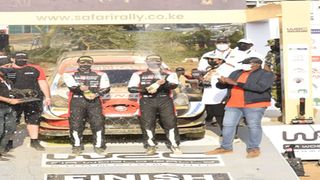
Sebastien Ogier and his navigator Julien Ingrassia celebrate their win during the award ceremony of the WRC Safari Rally in Naivasha on June 27,2021 as President Uhuru Kenyatta (left) and Sports CS Amina Mohammed look on.
| Cheboite Kigen | Nation Media GroupMotorsport
Premium
FIA chief Todt, WRC drivers give Safari Rally thumbs up
What you need to know:
- ‘Under the Safari Chief Executive Officer Kimathi, the team has worked wonders. I am extremely happy to see Kenya play a strong part in the WRC series,’ rally boss says.
- The Medical Team had mandatory equipment stipulated by FIA, a Medical Interventional Vehicle that was able to carry heavy cutting equipment used for extracting a casualty from a damaged car by cutting it in case of an accident. during the much-publicised competition.
After a 19-year haitus, the iconic Safari Rally made a grand return to the World Rally Championship series.
Seven-time world champion Sebastian Ogier showed the stuff he is made of when he conquered the treacherous terrain to claim victory. The Frenchman’s Toyota teammate Japanese Takamoto Katsuta was second and Hyundai’s Estonian ace Ott Tanak finished third.
Onkar Rai was the best placed Kenyan at position seven, followed by Karen Patel while Carl “Flash” Tundo was ninth.
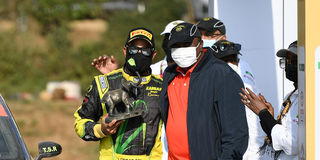
Kenyan driver Onkar Rai (left) poses for a photograph with Kenyan President Uhuru Kenyatta (right) after winning the WRC 3 division of the 2021 Safari Rally Kenya near Hell’s Gate at Lake Naivasha, Kenya, on June 27, 2021.
World motorsport governing body FIA President Jean Todt commended the organisers for their brilliant work and for delivering a successful event.
“Under the WRC Chief Executive Officer Phineas Kimathi, the team has worked wonders. I am extremely happy to see Kenya play a strong part in the WRC series. They have followed every step to ensure the event is run as per the FIA rules. I thank President Uhuru Kenyatta, Kimathi and the entire team for preparing this great event at the highest level,’’ said Todt.
He also thanked senior Kenya Wildlife Services officials for allowing the rally to be run on their grounds. The FIA supremo said that wildlife in Kenya plays a major role in promoting the rally across the globe.
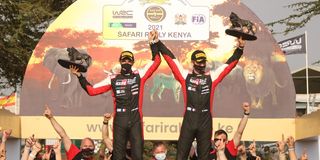
Sebastien Ogier (left) and his navigator Julien Ingrassia celebrate their win during the award ceremony of the WRC Safari Rally in Naivasha on June 27,2021

Kenyan driver Onkar Rai (left) poses for a photograph with Kenyan President Uhuru Kenyatta (right) after winning the WRC 3 division of the 2021 Safari Rally Kenya near Hell’s Gate at Lake Naivasha, Kenya, on June 27, 2021.
Todt’s sentiments were shared by leading drivers Ogier, Katsuta, Tanak and local hero Onkar Rai. The drivers said they will be happy to come back next year.
“I will definitely come to Kenya again. The rally was well-organised. I was happy to see so many spectators and the beautiful stages where we could see wildlife. The stages were good,’’ said Ogier
Upcoming Japanese star Katsuta said that he met friendly people in a beautiful country. He also said that he will return to Kenya again. Katsuta said that he would have loved to win the rally this time round, but that he has plenty of time ahead of him to try again.
VW Polo’s Onkar Rai, who was seventh, and first in the Kenya National Rally Championship also praised the organisers.
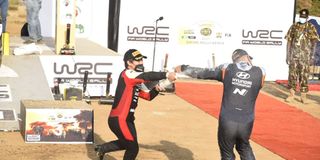
Sebastien Ogier (left) and his navigator Julien Ingrassia celebrate their win during the award ceremony of the WRC Safari Rally in Naivasha on June 27, 2021
“The rally was well-organised and that makes me very proud of our country Kenya. We would love to have more WRC partcipant countries in Africa to enjoy this atmosphere more often. I am happy to have won the WRC3 Class,” said Rai.
The Media Centre was also rated as one of the most organised in the Safari Rally’s history. The media played an important role in promoting the rally months before the actual competition. The publicity in both print and electronic was massive.
The Medics’ Team under Dr Raj Jutley was efficient. They monitored the Covid-19 situations prior, during and after the rally. All the people entering the Service Park, whether local or foreign-based crews, were checked to make sure everyone was safe.
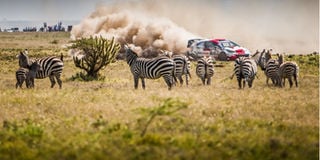
French driver Sebastien Ogier steers his Toyota Yaris WRC with French co-driver Julien Ingrassia during the SS15 stage of the 2021 Safari Rally Kenya in Hell's Gate, Naivasha on June 27, 2021.
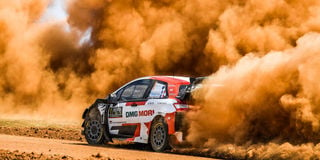
French driver Sebastien Ogier steers his Toyota Yaris WRC with French co-driver Julien Ingrassia during the SS17 stage of the 2021 Safari Rally Kenya at Loldia, Naivasha on June 27, 2021.
Apart from Kimathi, the rest of the organising team included Jim Kahumbura (Event Director), Commissioner of Police J.M. Kabiru (Chief Security Officer), Gurvir Bhabra (Clerk of the Course), Anwar Sidi (Media Safety and Route Liaison), Pater Njenga (Media Director), Gishinga Njoroge (Special Consultant), Musa Locho (FIA Technical officer), Prof. Raj Jutley (Chief Medical Officer), Elias Makori (Media Officer) and Norris Ongalo (Chief Safety Officer).
Twenty-six drivers finished the grueling rally in the main category of the WRC Safari Rally. Out of this 16 were from the National Category which was won by Onkar Rai.
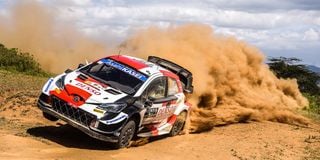
Japanese driver Takamoto Katsuta steers his Toyota Yaris WRC with British co-driver Daniel Barritt during the SS16 stage of the 2021 Safari Rally Kenya at Malewa, Naivasha on June 27, 2021.
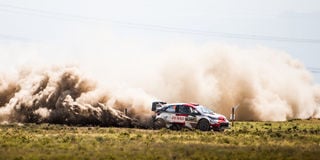
Japanese driver Takamoto Katsuta steers his Toyota Yaris WRC with British co-driver Daniel Barritt during the SS14 stage of the 2021 Safari Rally Kenya at Loldia, Naivasha on June 27, 2021.
Ogier won in the RC1 Group while Rai triumphed in the RC3 Class. Those who failed to compete in the RC2 Group were classified in other classes which scored points for the local championship. Rai scored six points for finishing in the main WRC Class while he was awarded 30 points as the top driver in the local series.
The sole female driver, Maxine Wahome who was navigated by Chantal Young, finished in the National Class and was awarded the Coupe Des Dames Trophy for being an all-female crew.
The 2021 WRC Safari Rally was a lot different from the past events. In the Safari of yore, crews had to conver long distances countrywide over a long duration.
The longest section then was 240 kilometres while in the present Safari, the longest section was 34kms. Organisers had to conform with the latest tough FIA rules for the Safari Rally to be part of the WRC calendar.
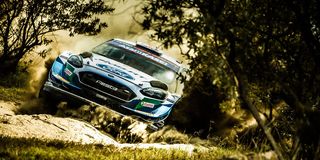
British driver Gus Greensmith drives his Ford Fiesta WRC with Irish co-driver Chris Patterson during the SS17 stage of the 2021 Safari Rally Kenya at Loldia, Naivasha on June 27, 2021.
The scrutineering rules were clear, however, several local drivers were either disqualified or demoted to a lower class in the competition for failing to comply.
The eligible cars had to adhere to the 2021 FIA World Rally Championship Sporting Regulations. National Cars homologated or approved by the ASN of the organising country, are permitted to compete but did not score WRC Championship points as defined in WRC Sporting Regulations.
These cars , however, had to comply with the safety requirements as stipulated in the rules. Dr. Jutley, who has performed high-level duties in the sport of rallying, was in charge of the medical team.
The 48-year-old open heart surgeon (cardio-thoracic surgery) headed a team of 40 doctors and paramedical staff.
The team had more than 30 ambulances, 20 doctors and two helicopters. One of the helicopters was always on standby. The police were stationed at the rally headquarters to ensure law and order prevailed.
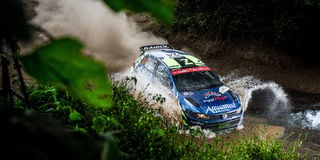
Kenya’ Onkar Rai navigated by Drew Sturrock steers his Volkswagen Polo during the SS17 stage of the 2021 Safari Rally Kenya at Loldia, Naivasha on June 27, 2021.
The Medical Team had mandatory equipment stipulated by FIA, a Medical Interventional Vehicle that was able to carry heavy cutting equipment used for extracting a casualty from a damaged car by cutting it in case of an accident. during the much-publicised competition.




